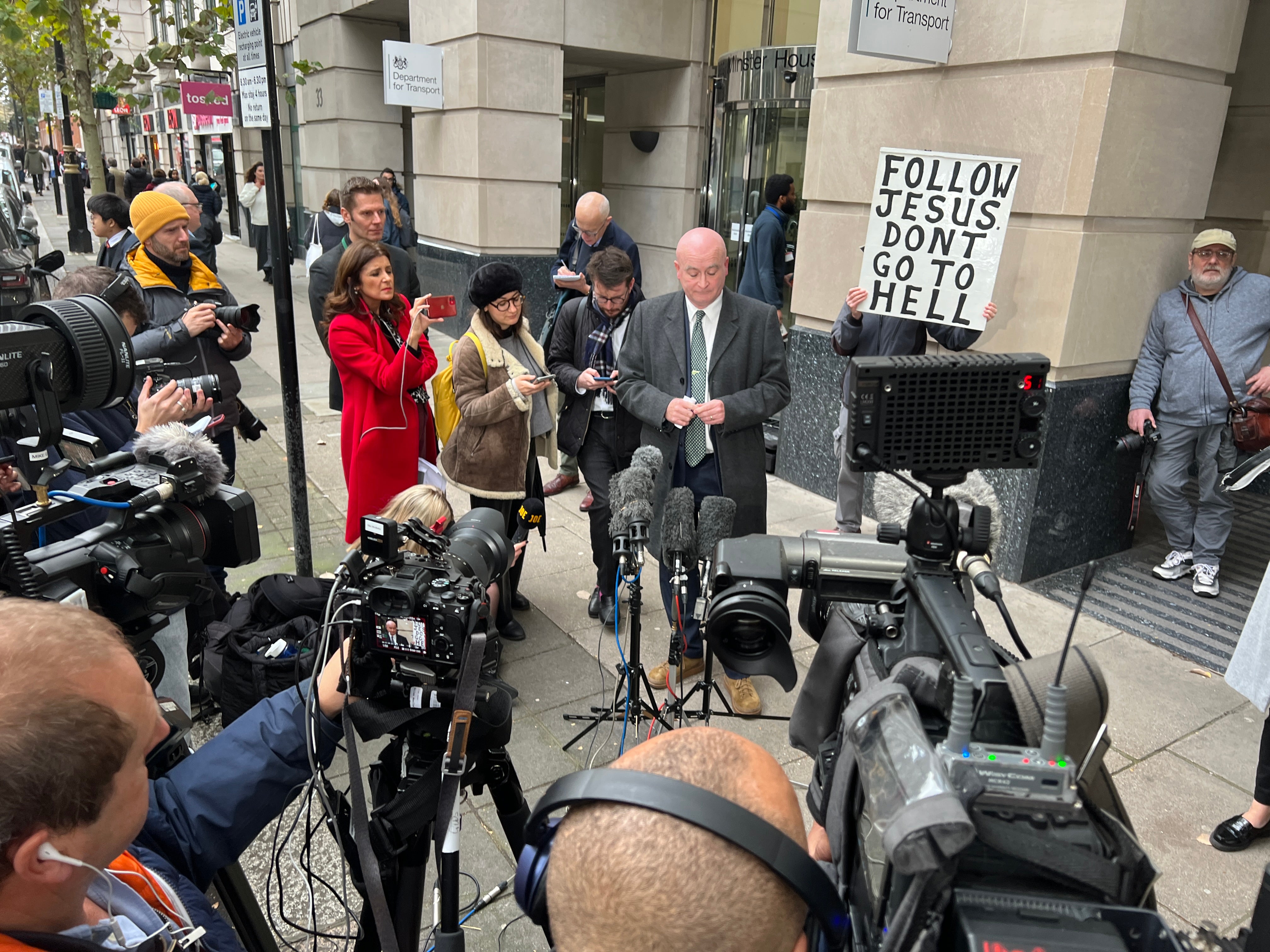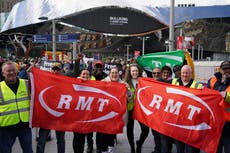If the rail strikes aren’t all over before Christmas, a spiral of decline will resume
The Christmas period is already going to be difficult for a lot of travellers, writes Simon Calder. If the rail disputes aren’t solved there’ll be plenty of New Year’s resolutions to stay clear of trains


Pre-pone” is a term used in India that deserves to be more widely used, especially in the realm of travel. I am writing to you aboard the 2.45pm from Charing Cross, London to Hastings – a train that, an hour ago, I had no intention of catching. Fortunately, I had checked ahead to see if the single-track, once-an-hour link between Hastings and Ashford in Kent was running normally. No, came back the answer: some trains are cancelled due to an unspecified shortage of something.
Even when no one is on strike, rail passengers are accustomed to a certain amount of business-as-usual disruption. So I pre-poned and bought a ticket to Rye (via Hastings) more hastily than I had expected with the intention of getting to Ashford from there instead.
On these brief days, an afternoon train can be an unexpected joy. The setting sun to the west is anointing the late autumnal hillsides of the North Downs. Trim deep green meadows are embroidered by trees of fiery gold. Bliss. Autumn leaves on the line permitting, I shall make a connection at the exotically named St Leonard’s Warrior Square in about an hour. Which gives me time to worry about state of the nation’s railway – and the people who travel on it, work on it and pay for it.
Unless your train adventures began in the 1980s or earlier, you will never have known a railway where travel plans are so vulnerable to strike after strike after strike. Eight days of national stoppages by the main rail union, the RMT, began on midsummer’s day and since 21 June millions of journeys have been wrecked by walk-outs.
Over the next five weeks, barring a solution to the tangle of grievances among rail staff, workers will strike for a further eight days.
Besides the main dispute with Network Rail and 14 train operators, the RMT this week announced additional strikes by cleaners on the railway as well as security officers working for Eurostar. So complex has the picture of industrial action become that, when I talked to the union’s general secretary, Mick Lynch, this week, both he and I struggled to recall exactly who was walking out when without consulting our notes.
The “why?” is easier to answer. Pay is at the centre: railway staff say they have had no increase for three years, at a time of rocketing inflation. With job cuts looming, they want guarantees of no compulsory redundancies. And that term “working conditions” – what it really means is that the unions are accustomed to extracting a percentage or two added to pay in return for productivity gains.
The RMT is only one of the unions involved. This weekend, passengers on East Midlands Railway will find services from Sheffield, Derby, Nottingham and Leicester once again in disarray due to action by members of the Unite union. The Transport Salaried Staffs’ Association (TSSA) has announced a complex series of stoppages and “action short of a strike”, particularly involving c2c (from London to south Essex) and Avanti West Coast. The unfortunate franchisee on the West Coast mainline is the current recipient of the regular kicking administered by politicians and unions to a particular train operator; previous incumbents include Southern, Thameslink and Northern.

In the Commons on Thursday, the Tory MP for Stoke on Trent Central, Jo Gideon, said: “Everything to do with the Avanti rail service is appalling.” She accused the company of “overcharging”; but all its operations and most of its fares are specified by the Department for Transport (DfT).
It is certainly the case that long-suffering passengers from northwest England and the West Midlands to London have significantly fewer services than before the pandemic. Since the summer, train drivers have exercised their right not to work on their days off. Avanti West Coast was reliant on overtime to run the full schedule, and only slowly is it bringing in newly trained drivers.
Train drivers, almost all of them members of the Associated Society of Locomotive Engineers and Firemen (Aslef) have their own disputes with 11 train operators. Talking to the general secretary, Mick Whelan, I detected no inclination to join in the pre-Christmas jostle of strikes – though don’t plan any festive journeys solely on the basis of my assessment. He remains, though, as angry as his counterparts at the other unions. Their members are impatient for a fair settlement after working through the pandemic.
If a deal is to be done, it is not a simple matter of finding a compromise and shaking hands. There is not one settlement to be made – there are dozens
But “a fair settlement” is hard to define. In other branches of the travel industry, particularly aviation, tens of thousands of workers lost their jobs as revenue collapsed. British Airways comprehensively reformed working practices and was accused of never letting a good crisis go to waste. No one in regular employment on the UK railway was made redundant and no big changes were made, with the taxpayer paying around £1m per hour to keep mostly empty trains running right through the pandemic.
Since Covid, the government has taken back control, and financial risk, of the railways. Labour, which spent its 13 years in power studiously not nationalising the railways, is now calling for public ownership – all the while knowing that the only real point of discussion is the extent to which services are contracted out to private companies that make a modest percentage on the deal. The government, meanwhile, also has a narrative that stretches credibility. Nothing to do with us, says the third transport secretary in three months, Mark Harper. We aren’t the employers.
For many thousands of workers, they actually are. Network Rail, LNER and Northern Trains, for example, are subsidiaries of the DfT. And the pay rise, when finally agreed, may partly come from modernisation. But mostly the taxpayer will stump up again to fill the gap between revenue and cost. There can be no pretence of free collective bargaining when the employers, represented by the Rail Delivery Group and Network Rail, are entirely dependent on the transport secretary signing it off.
In turn, Mr Harper needs permission to increase spending from Jeremy Hunt, desperate to bring some sanity back to public finances after Liz Truss tanked the economy. And the occupants of both No 11 and No 10 know that every other public sector union will be waiting to seize upon any settlement that comes close to matching inflation – and doing all they can to keep the headline figure down.

All of these pressures are building up in meeting rooms this weekend. The clock is ticking. The next series of national walk-outs is due to begin on Tuesday 13 December. With rosters to draw and timetables to publish, cancellations will start to be made a week in advance. As “the strike that never was” in October showed if the RMT call off a stoppage at late notice the damage to passengers’ journeys and rail revenue is already done.
If a deal is to be done, it is not a simple matter of finding a compromise and shaking hands. There is not one settlement to be made – there are dozens. The high-level negotiations involving the RMT, Network Rail and the Rail Delivery Group are trying to find a template that can be used by all the train operators and unions.
The headline figures from the employers suggest a 4 per cent increase for each of the two years. The unions are determined to secure 7 per cent. How can the two sides meet? The eventual deal will be carefully constructed to allow the unions to portray an impressive headline figure for their members, who have lost many hundreds of pounds in pay through industrial action, while also enabling ministers to say that much of the rise is contingent on productivity and therefore cannot be translated to similar rises for public sector workers such as NHS staff and teachers. Pay particular attention to an offer of 75 per cent unrestricted discounted travel for partners and dependents of rail workers, which is potentially worth thousands of pounds annually and will help disguise the actual level of settlement.
The other side of the coin is ticket revenue. The reliable billions that poured in each year from commuters have evaporated in the post-Covid world where working from home is the new normal for many. The gap could be filled by new passengers or travellers making extra leisure journeys. But they need to have confidence in the service, which no one can these dark days. “Certainty is what we need,” one commuter in Sussex tells me. Passengers also need to regard the tickets as good value. Expect a sub-inflation 4 per cent increase in specified fares in March 2023, which will do little to fill the gap and yet will attract outrage from passengers and politicians.
More immediately, if the warring sides don’t find an agreement, the damage will run much deeper. Christmas and New Year are going to be pretty awful anyway for a lot of travellers with London Liverpool Street station closed for the duration due to rail engineering work. If the pickets move in as soon as Network Rail’s engineers move out, there will be plenty of New Year's resolutions to stay well clear of trains. Unless they make progress by close of play on Tuesday, it will be too late: cuts in services will go into the rosters and the railway planners. The cycle of disruption and the spiral of decline will continue.
Join our commenting forum
Join thought-provoking conversations, follow other Independent readers and see their replies
Comments



Bookmark popover
Removed from bookmarks